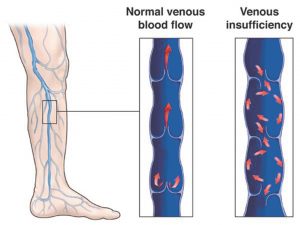 Chronic Venous Insufficiency (CVI) is a common and progressive medical condition that affects the veins in the legs. It occurs when the valves inside the veins become damaged or weakened, causing blood to pool or flow backward instead of returning to the heart. This condition can lead to various symptoms and complications if left untreated.
Chronic Venous Insufficiency (CVI) is a common and progressive medical condition that affects the veins in the legs. It occurs when the valves inside the veins become damaged or weakened, causing blood to pool or flow backward instead of returning to the heart. This condition can lead to various symptoms and complications if left untreated.
Causes and Risk Factors
The primary cause of CVI is increased pressure within the veins, which can be attributed to various factors. Some of the most common risk factors include:
1. Age: As we get older, the veins can lose their elasticity, making it harder for them to pump blood back to the heart efficiently.
2. Obesity: Excess weight puts additional strain on the veins, increasing the risk of valve damage.
3. Pregnancy: The added weight and pressure during pregnancy can contribute to the development of CVI.
4. Lack of mobility: Prolonged sitting or standing can impair blood flow in the legs, leading to increased pressure in the veins.
5. Family history: CVI can have a genetic component, and individuals with a family history of the condition are at a higher risk.
Symptoms and Complications
The symptoms of CVI can range from mild to severe, depending on the severity of the condition. Some of the most common symptoms include:
1. Swollen legs and ankles: This is often one of the earliest signs of CVI, caused by the pooling of blood in the veins.
2. Leg cramps: Muscle cramps, particularly in the calves, can occur due to poor circulation.
3. Skin discoloration: The skin on the legs may appear reddish or brownish, a condition known as venous stasis dermatitis.
4. Varicose veins: These bulging, twisted veins are a visible sign of CVI and can be uncomfortable or painful.
5. Leg ulcers: In severe cases, CVI can lead to the formation of open wounds or ulcers on the legs, which can be difficult to heal.
If left untreated, CVI can progress and lead to various complications, including deep vein thrombosis (DVT), a potentially life-threatening condition where blood clots form in the deep veins of the legs.
Treatment and Management
The treatment and management of CVI primarily focus on relieving symptoms, improving circulation, and preventing further complications. Here are some common approaches:
1. Compression stockings: These specialized socks or stockings apply gentle pressure to the legs, helping to improve blood flow and reduce swelling.
2. Lifestyle changes: Maintaining a healthy weight, exercising regularly, and avoiding prolonged periods of sitting or standing can help alleviate symptoms and slow the progression of CVI.
3. Elevating the legs: Keeping the legs elevated above the level of the heart can help reduce swelling and improve circulation.
4. Medications: In some cases, medications may be prescribed to improve circulation or manage pain and inflammation.
5. Surgical interventions: For severe cases or when other treatments are ineffective, surgical procedures such as vein ligation, stripping, or ablation may be recommended to remove or close off damaged veins.
Prevention and Early Intervention
While CVI cannot always be prevented, there are steps individuals can take to reduce their risk and catch the condition early:
1. Regular exercise: Engaging in physical activity, such as walking or swimming, can help improve circulation and maintain healthy veins.
2. Maintaining a healthy weight: Carrying excess weight can put unnecessary strain on the veins in the legs.
3. Avoiding prolonged standing or sitting: Taking breaks to move around and stretch the legs can help promote healthy blood flow.
4. Early treatment: If you notice symptoms such as swollen legs, varicose veins, or skin discoloration, it is essential to seek medical attention promptly.
By understanding the causes, symptoms, and treatment options for Chronic Venous Insufficiency, individuals can take proactive steps to manage this condition and prevent further complications.
Vascular and Vein Center at Gulfcoast Surgeons has been one of the most respected vein clinics in Southwest Florida for over 30 years. Our surgeons, Dr. Abraham Sadighi, Dr. Johan Escribano, and Dr. Vijayakumar Tanjavur have performed thousands of vascular and vein surgeries with consistently positive outcomes.
We focus on diseases of the vascular system that can range from harmless but unattractive spider veins to dangerous conditions such as peripheral artery disease. Our caring and dedicated team will help you identify problems and offer the best treatment options for you.
Vascular and Vein Center at Gulfcoast Surgeons
877-LEG-PAIN
gulfcoastsurgeons.com
Fort Myers
8010 Summerlin Lakes Dr., Ste. 100
Fort Myers, FL 33907
Cape Coral
1003 Del Prado Blvd., Ste. 303
Cape Coral, FL 33990
Bonita Springs
24301 Walden Center Dr., Ste. 102
Bonita Springs, FL 34134










